Coronavirus Today: Disturbing new data about Delta
- Share via
Good evening. I’m Karen Kaplan, and it’s Friday, July 30. Here’s what’s happening with the coronavirus in California and beyond.
When Dr. Rochelle Walensky announced this week that the federal Centers for Disease Control and Prevention had updated its guidance on face masks to recommend that everyone wear them indoors in most parts of the country, she said she was reluctant to make the decision. The CDC director understood that many Americans were tired of the pandemic and the actions required to combat it, but she said new evidence about the dangers posed by the fast-spreading Delta variant gave her no choice.
On Friday, the CDC shared some of the alarming data that led to that decision.
That data come from an outbreak this month in Barnstable County, Mass., home to Cape Cod. It’s a popular vacation area where 69% of the residents who are eligible for COVID-19 vaccines have taken them. But that wasn’t enough to stop an outbreak involving 469 people and counting.
It’s not just the number of cases that got experts’ attention. It was the fact that as recently as July 3, there were no known coronavirus infections among residents. But just two weeks later, the county was averaging 177 cases per 100,000 people.
What’s more, 74% of the 469 infections were in people who were fully vaccinated against COVID-19. And among 133 viral samples that were genetically sequenced, 90% were identified as the Delta variant or an offshoot of the strain.
Apparently, the Delta variant spread just as easily among vaccinated and unvaccinated people who gathered in restaurants, bars and vacation homes. That does not bode well, experts around the country told us.
“Delta is basically coronavirus on speed,” said Dr. Gregory Poland, an immunologist at the Mayo Clinic in Rochester, Minn.
Experts inside the CDC were struck by the Massachusetts data too, along with evidence from India, where fully vaccinated people who became infected with Delta had higher viral loads than vaccinated people who were infected with other coronavirus strains.
Considering that an estimated 82% of recent coronavirus cases in the U.S. were caused by Delta, people inside the CDC argued that something had to be done. They made their case in a confidential document that was obtained by the Washington Post and published on its website.
Asking fully vaccinated people in coronavirus hot spots to wear face masks indoors is only part of what’s needed to get the country’s growing outbreak under control, the unnamed authors of the CDC document wrote. Health officials will also have to level with the public about the fact that “breakthrough” infections are no longer “rare” or make up just a “small percentage” of cases.
In short, the CDC must “acknowledge the war has changed,” the document states.
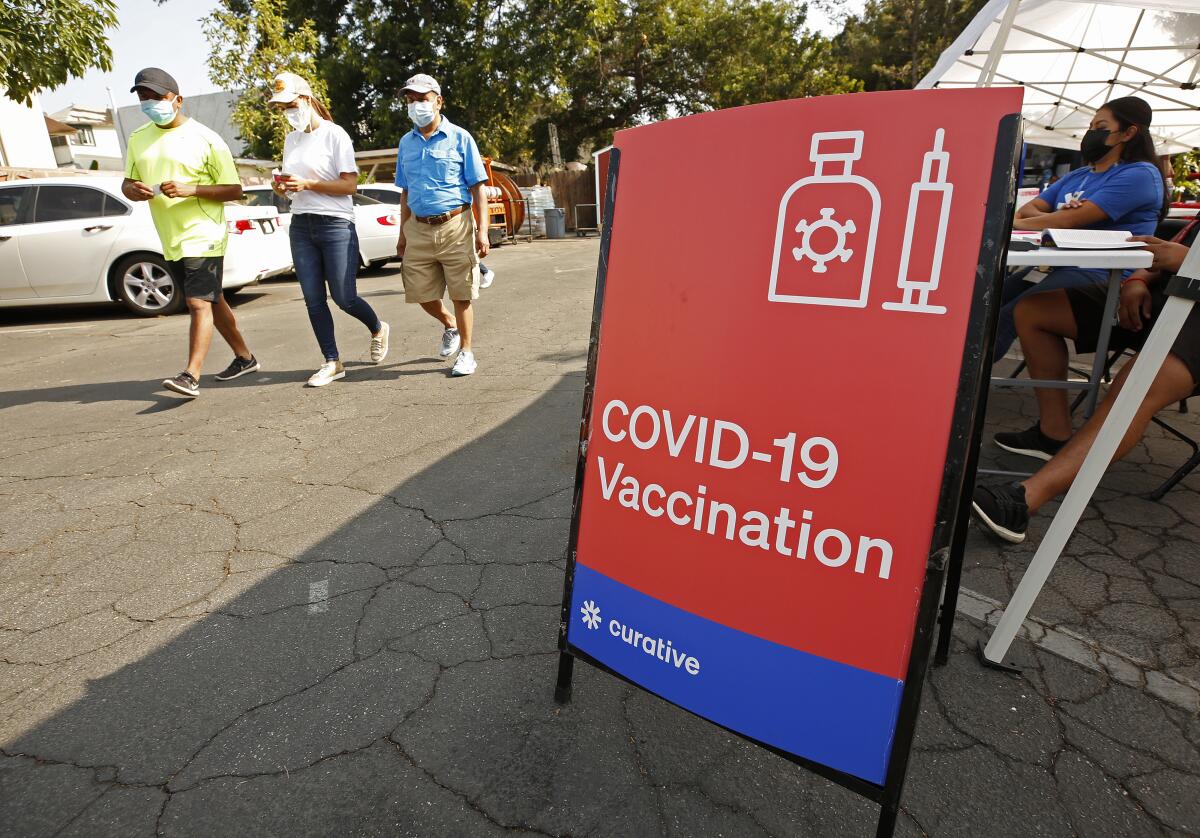
Unfortunately, health officials expect such messages to complicate their efforts to persuade holdouts to roll up their sleeves. Acknowledging that breakthrough infections are on the rise — and that being vaccinated no longer means getting to toss your face mask — is sure to make the shots even less appealing to the people who are still on the fence.
Kendra Findley, the administrator of community health and epidemiology in Greene County, Mo., said the CDC can’t help changing its advice in response to new information, even if it makes jobs like hers tougher.
“We are trying to adapt and respond to this virus as it occurs,” she said. “Unfortunately, we’ve had to come up with the correct messaging and tell people how to protect themselves when we’re just learning about it.”
Here’s an argument she and her colleagues around the country can make: As of Saturday, the rate of new coronavirus infections in the U.S. was eight times higher among those who were not vaccinated than those who were, and the incidences of COVID-19 hospitalizations and deaths were 25 times higher for the unvaccinated.
I, for one, will be wishing them luck. With only half of the U.S. population fully vaccinated and a virus that replicates and transmits robustly even among those who are inoculated, conditions are ripe for new variants to emerge, said Dr. Megan Ranney, a physician and associate dean at the Brown University School of Public Health.
“You couldn’t design a better experiment for creating a vaccine-resistant variant,” she said.
By the numbers
California cases, deaths and vaccinations as of 7 p.m. Friday:

Track California’s coronavirus spread and vaccination efforts — including the latest numbers and how they break down — with our graphics.
Anger or empathy for those who are unvaccinated?
At least 90 million Americans who are eligible for the COVID-19 vaccines have yet to take advantage of the life-saving shots.
The longer they hold out, the easier it will be for the Delta variant to continue its relentless assault on communities across the country, causing case numbers to rise to levels not seen since the waning days of the winter surge.
And let’s not forget that the more unvaccinated bodies there are within the coronavirus’ reach, the more chances it will have to keep mutating in ways that could wind up making Delta look like a walk in the park.
If thoughts like these have been on your mind, you might be feeling Gov. Gavin Newsom. He’s been going after right-wing anti-vaccine pundits — and the people who listen to them.
He also likened vaccine resisters to drunk drivers — hardly a sympathetic group.
“It’s a choice to live with this virus, and with all due respect, you don’t have the choice to go out and drink and drive and put everybody else’s lives at risk,” he said. “That’s the equivalent of this moment with the deadliness and efficiency of the Delta [variant]. You’re putting other people’s, innocent people’s lives at risk.”
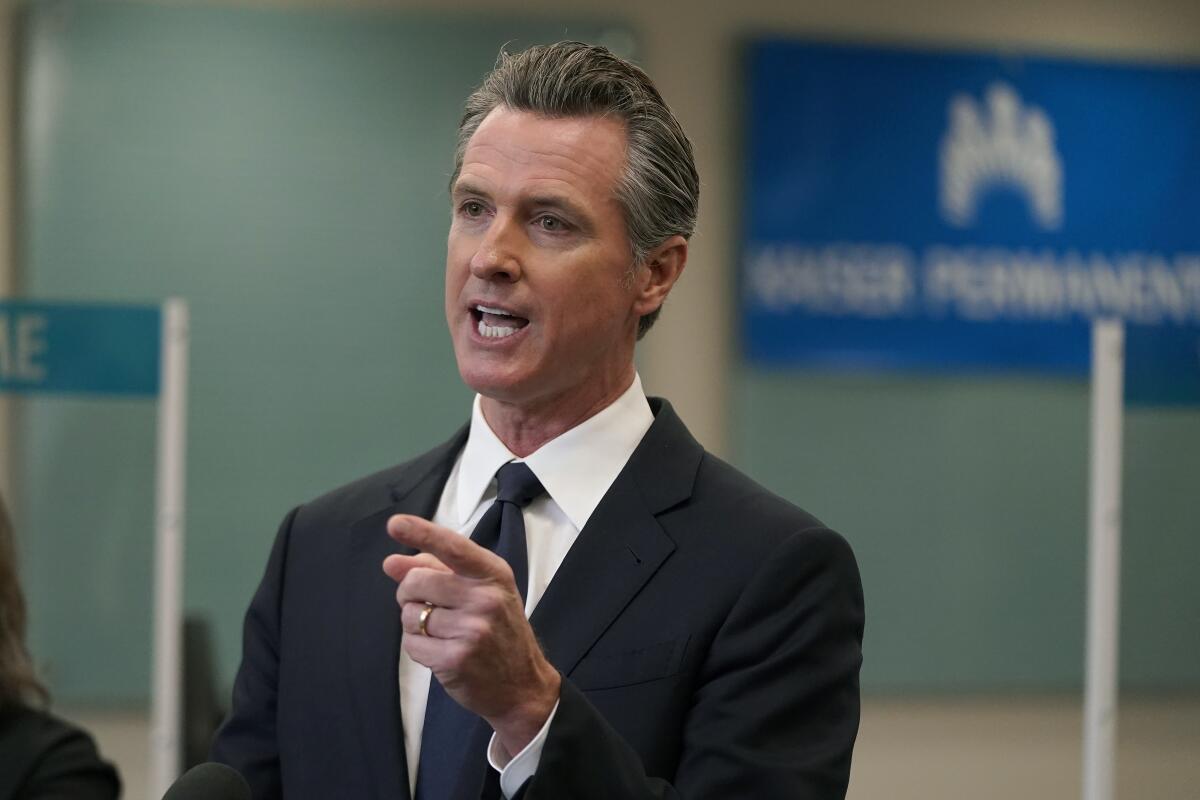
The outrage comes easily — much too easily, my colleague Erika D. Smith explains in a thought-provoking column.
As someone who got vaccinated at the earliest opportunity and volunteered at a COVID-19 vaccine clinic, Smith shares Newsom’s frustration. But as a Black woman who understands firsthand how systemic racism undermines trust in the healthcare system, she can empathize with people who are still skeptical about the shots.
That includes several relatives and longtime friends she recently visited in Ohio. One of her uncles who seems to be “afraid of white doctors and the medical establishment” isn’t vaccinated and will probably remain that way. A cousin is holding out because she is sure the mainstream media are suppressing unflattering information about side effects.
A friend told her she’s planning to get vaccinated now that her boyfriend’s employer is requiring the shots, but the friend’s sister still refuses to roll up her sleeve even though she has a job in the healthcare industry.
These discussions make it impossible for Smith to get on board with Newsom’s attack. “There’s an inherent white privilege in white rage at the unvaccinated,” she writes.
Besides, it’s too soon to write off everyone who’s still unvaccinated. Some of those people are changing their minds.
Marco Figueroa, for instance, opted to get vaccinated during his lunch hour last week after he noticed a sign advertising free shots nearby. It was an opportunity the 42-year-old had been waiting for but couldn’t seek out because it would mean missing a whole day of work. As it was, he worried about falling behind on his deliveries as he waited for his dose to be prepared.
Ericka Millan, 27, visited the same clinic to prepare for a teaching job that starts next month. She had delayed because she recently learned she had an autoimmune disease and wasn’t sure how the vaccine would affect her. With COVID-19 cases mounting at her husband’s work, she decided the shot was worth the risk.
Another 27-year-old, Jennifer Pajounia, held off on the vaccine because she survived a bout with COVID-19 last fall and figured she was already protected. But with her fear rising along with new cases, she decided to take matters into her own hands.
“I thought to myself, ‘I’m tired of being scared and wondering if it’s COVID or not,’” Pajounia told my colleague Brittny Mejia. “I might as well just get vaccinated to avoid that.”
California’s vaccination progress
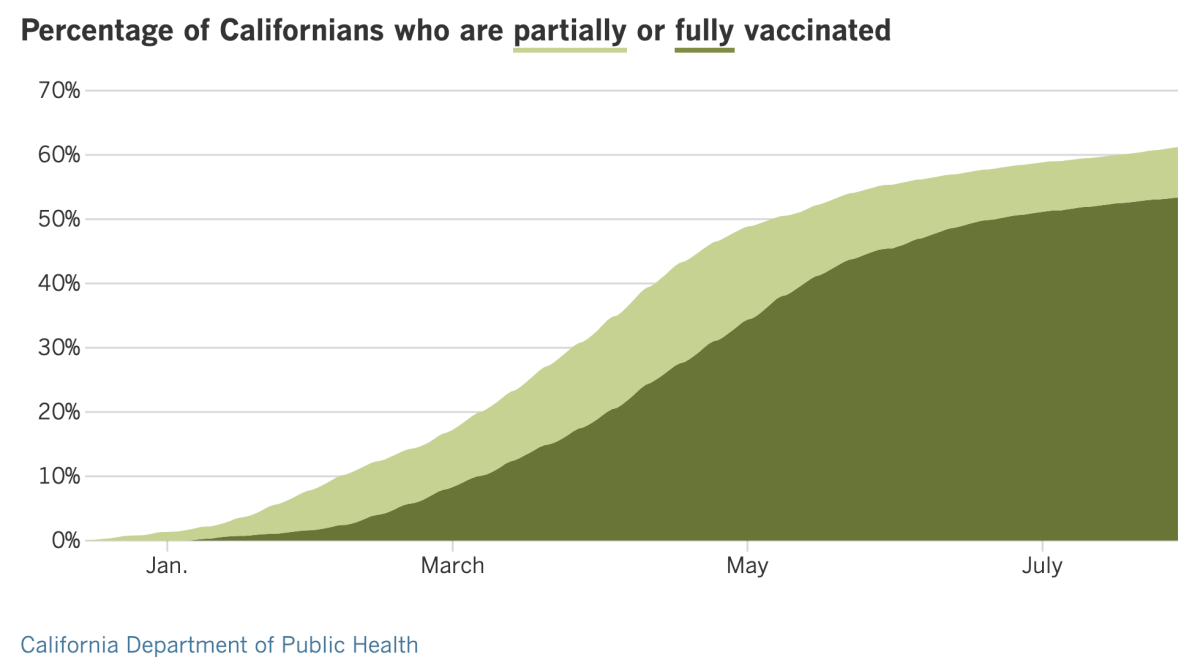
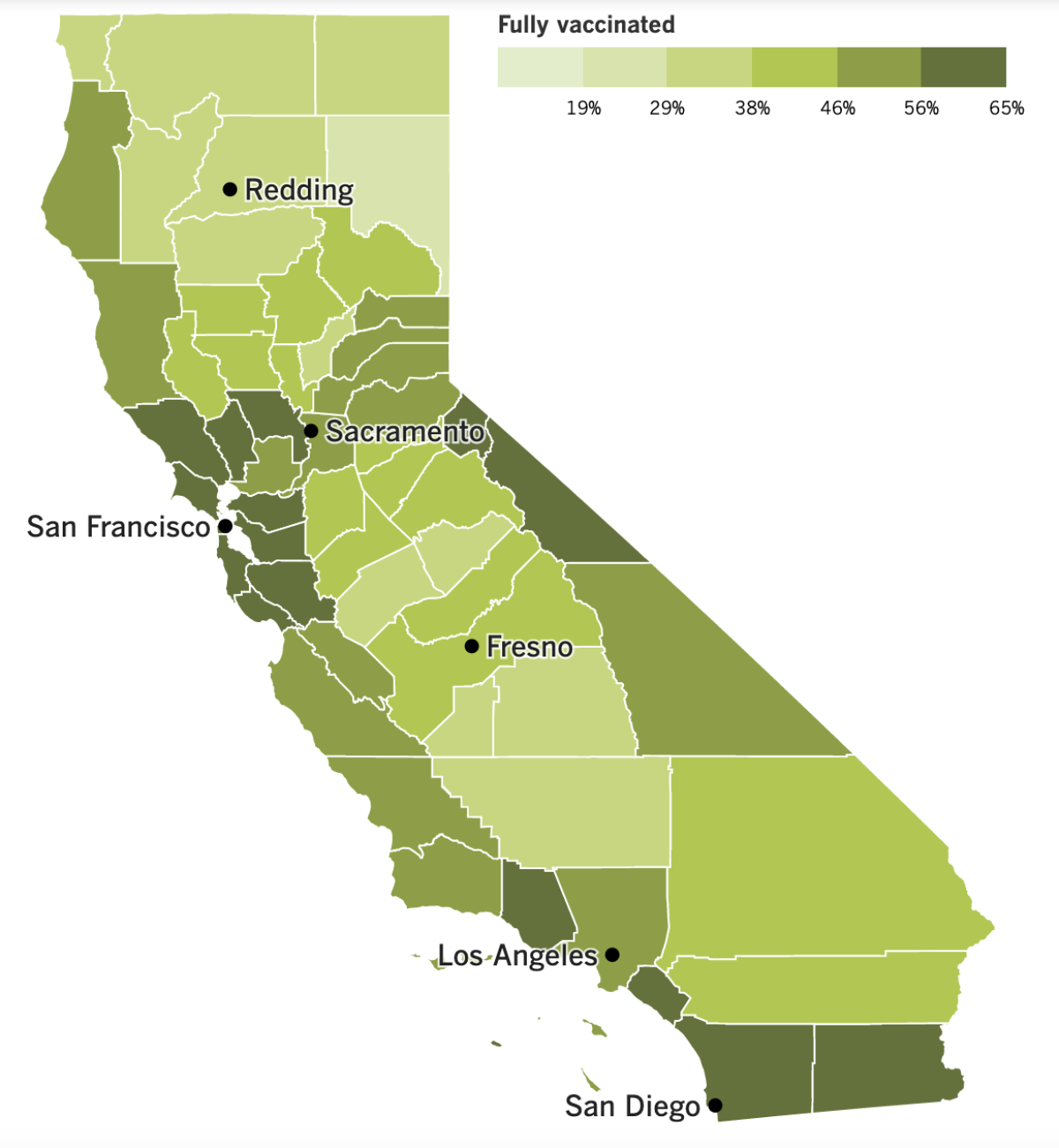
See the latest on California’s vaccination progress with our tracker.
Consider subscribing to the Los Angeles Times
Your support helps us deliver the news that matters most. Become a subscriber.
In other news ...
Breakthrough infections are up in Los Angeles County, accounting for 26% of confirmed cases among residents 16 and up during the first half of July. That’s up from 20% in June, according to data from the county’s Department of Public Health.
But that still means that cases involving unvaccinated people outnumbered those involving vaccinated people by a margin of 3 to 1, even though unvaccinated people have been a minority of the population since early July. And vaccinated people who do become infected are far less likely than their unvaccinated peers to require hospital care.
“Although vaccinated people are seeing a rise in new COVID diagnosis, they are primarily experiencing their infections not as severe illnesses that bring them to the emergency room, but as bad colds,” said Barbara Ferrer, the county’s public health director. Those who are unvaccinated “simply do not have the same level of confidence if they get infected with this virus that it will lead to mild illness.”
In recognition of the rising number of breakthrough cases, the L.A. Unified School District said Thursday that all students and employees will be required to take weekly coronavirus tests whether they’re vaccinated or not. That’s a change from the previous policy, which required testing only for the unvaccinated.
“We are closely monitoring evolving health conditions and adapting our response in preparation for our full return to in-person learning on August 16,” interim Supt. Megan K. Reilly wrote in a letter to parents.
Families can avoid the coronavirus tests by choosing distance learning and remaining off campus. However, officials encouraged students to return to school, saying that’s the best way for most students to learn. Baseline testing for students coming back to school will begin Aug. 2.
Health officials in Orange County are hoping that some of the folks coming to the fairgrounds for carnival rides and delicacies like Hot Cheeto-n-Cheese Pickles will also be game for a COVID-19 shot.
The OC Health Care Agency will offer the free shots on Wednesdays, Thursdays, Fridays and Sundays until the fair ends Aug. 15. The Pfizer-BioNTech and Johnson & Johnson vaccines will be available on a walk-in basis in the fairground’s Costa Mesa building.
Orange County’s biggest entertainment destination, Disneyland, now requires guests ages 2 and up to wear masks indoors regardless of their vaccination status. The change in policy follows a recommendation issued Wednesday by state health officials advising all Californians to wear masks in public indoor settings to help beat back a new coronavirus surge.
Universal Studios Hollywood and Six Flags Magic Mountain have been requiring face coverings indoors since July 18, due to L.A. County’s mask mandate.
The coronavirus is so wily that it has managed to infect two endangered snow leopards at the San Diego Zoo. Staffers aren’t sure how Naphisa and Ramil became infected, but once Ramil tested positive last week, keepers presumed that Naphisa and two Amur leopards they live with had been exposed as well.
Both Naphisa and Ramil experienced coughs, which are beginning to improve. Ramil had a runny nose as well. The animals are eating and moving around normally, though their exhibit remains closed to the public.
The U.S. Food and Drug Administration had two pieces of good news for Johnson & Johnson this week.
The agency agreed to let a contract manufacturer in Baltimore resume making the single-dose vaccine. The factory operated by Emergent BioSolutions had been shut down in April after it was discovered that the product it was making for J&J had been contaminated with an ingredient for AstraZeneca’s COVID-19 vaccine. That ruined the equivalent of tens of millions of doses of J&J vaccine.
The FDA also extended the expiration dates for the vaccine, a move that gives health workers six more weeks to find arms for millions of unused doses. When properly stored and refrigerated, the shots remain safe and effective for at least six months, the agency said. When first authorized in February, the FDA said the vaccines could be safely stored for three months.
Officials in Japan reported 10,687 coronavirus cases on Thursday, exceeding 10,000 for the first time. The record spikes in infections prompted the government to expand its state of emergency beyond Tokyo to Saitama, Kanagawa and Chiba — all prefectures near Tokyo — as well as the western city of Osaka.
The emergency measures will become effective Monday and remain in place until Aug. 31. The state of emergency already in effect in Tokyo and the southern island of Okinawa will be extended until the end of August as well.
Cases in Tokyo have doubled since last week, rising to 3,865 on Thursday before falling to 3,300 on Friday. Nearly 3,000 people are hospitalized, and some hospitals are already full. More than 10,000 other people are isolating at home or in designated hotels. The city of nearly 14 million people is currently hosting the Olympics, but officials say the surge is unrelated to the Games.
Your questions answered
Today’s question comes from readers who want to know: Can employers require their workers to get vaccinated against COVID-19?
When we addressed this question earlier in the pandemic, legal experts told us the answer probably would be yes — though some cautioned that vaccine mandates would be a tough sell until the Food and Drug Administration officially approved the shots.
Three months later, a growing list of employers have indeed required workers to get vaccinated. So far, those policies have withstood legal challenges despite the fact that the vaccines are merely authorized for emergency use:
• A federal judge in New Mexico declined to block a vaccine mandate for firefighters, detention center officers and other workers in Doña Ana County while a legal challenge makes its way through the courts.
• Likewise, a federal judge in South Bend, Ind., denied a request to block enforcement of Indiana University’s COVID-19 vaccine requirement for students and employees until courts could decide on the merits of the policy.
• And a federal judge in Houston dismissed a case from employees of Houston Methodist Medical Center who argued that the hospital’s vaccine mandate was coercive and reduced them to the status of “human guinea pig[s].”
“Methodist is trying to do their business of saving lives without giving them the COVID-19 virus,” U.S. District Judge Lynn Hughes wrote. Lead plaintiff Jennifer Bridges “can freely choose to accept or refuse a COVID-19 vaccine; however, if she refuses, she will simply need to work somewhere else.”
Cases like these are still ongoing, and they’re sure to be joined by others as more workers find themselves subject to vaccine mandates. But it seems that the vaccines’ emergency use authorization alone will not prevent the mandates from being enforced.
“Not a single decision that I have seen treated the vaccine differently because it has only been conditionally approved,” Richard W. Warren, a Detroit-based lawyer who represents employers throughout the country, told my colleague Maura Dolan.
However, workers can be exempted from vaccine mandates for medical reasons or if vaccination violates their sincerely held religious beliefs, Warren added.
We want to hear from you. Email us your coronavirus questions, and we’ll do our best to answer them. Wondering if your question’s already been answered? Check out our archive here.
The pandemic in pictures
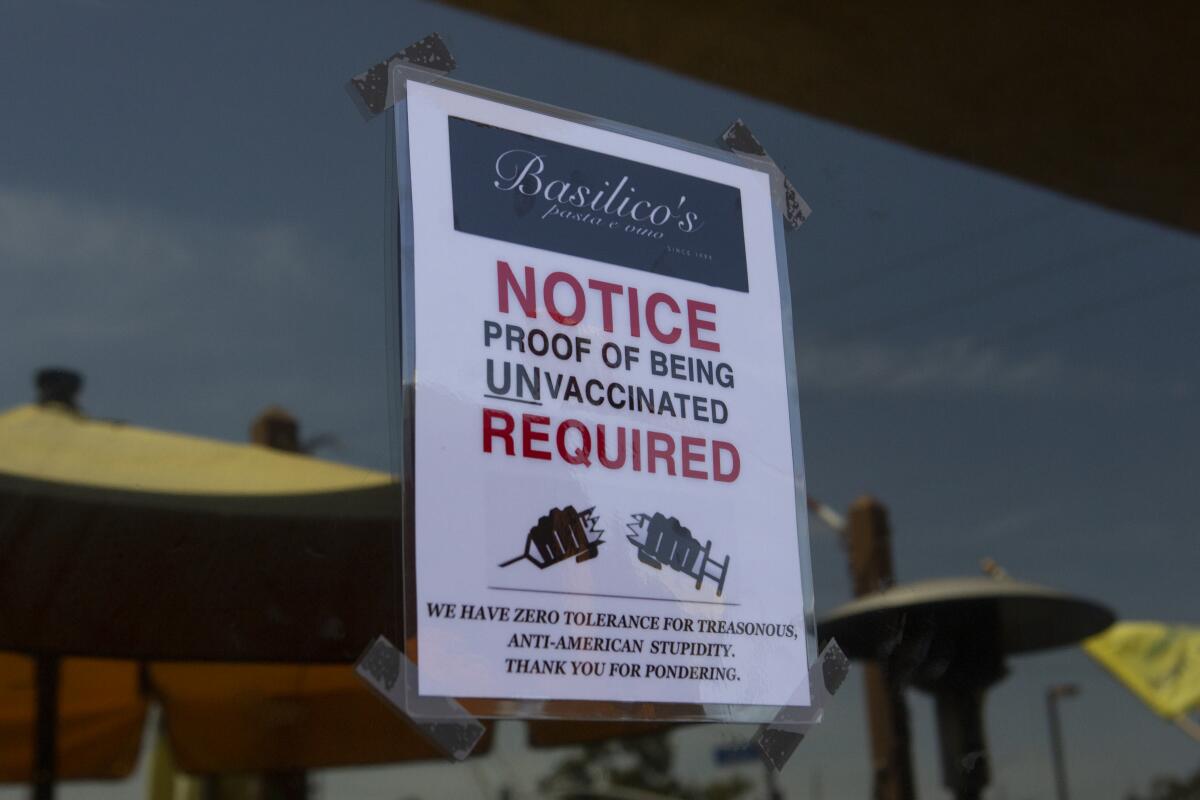
Last summer, when health officials said patrons of restaurants and other businesses needed to cover their faces to slow the coronavirus’ spread, Basilico’s Pasta e Vino declared itself a mask-free zone and asked diners to remove them. This week, the Huntington Beach eatery went a step further.
“Proof of being unvaccinated required,” according to a pair of notices taped to the windows. “We have zero tolerance for treasonous, anti-American stupidity.”
(That last statement is debatable, considering that researchers credit the vaccines with saving nearly 280,000 American lives and keeping about 1.25 million people out of hospitals.)
The restaurant isn’t actually checking prospective customers’ vaccination status before seating them, my colleague Hannah Fry reports. But the signs are noteworthy for illustrating the depth of some people’s resistance to COVID-19 vaccines, even as the Delta variant is putting unvaccinated people at heightened risk.
Resources
Need a vaccine? Sign up for email updates, and make an appointment where you live: City of Los Angeles | Los Angeles County | Kern County | Orange County | Riverside County | San Bernardino County | San Diego County | San Luis Obispo County | Santa Barbara County | Ventura County
Need more vaccine help? Talk to your healthcare provider. Call the state’s COVID-19 hotline at (833) 422-4255. And consult our county-by-county guides to getting vaccinated.
Practice social distancing using these tips, and wear a mask or two.
Watch for symptoms such as fever, cough, shortness of breath, chills, shaking with chills, muscle pain, headache, sore throat and loss of taste or smell. Here’s what to look for and when.
Need to get tested? Here’s where you can in L.A. County and around California.
Americans are hurting in many ways. We have advice for helping kids cope, resources for people experiencing domestic abuse and a newsletter to help you make ends meet.
We’ve answered hundreds of readers’ questions. Explore them in our archive here.
For our most up-to-date coverage, visit our homepage and our Health section, get our breaking news alerts, and follow us on Twitter and Instagram.




